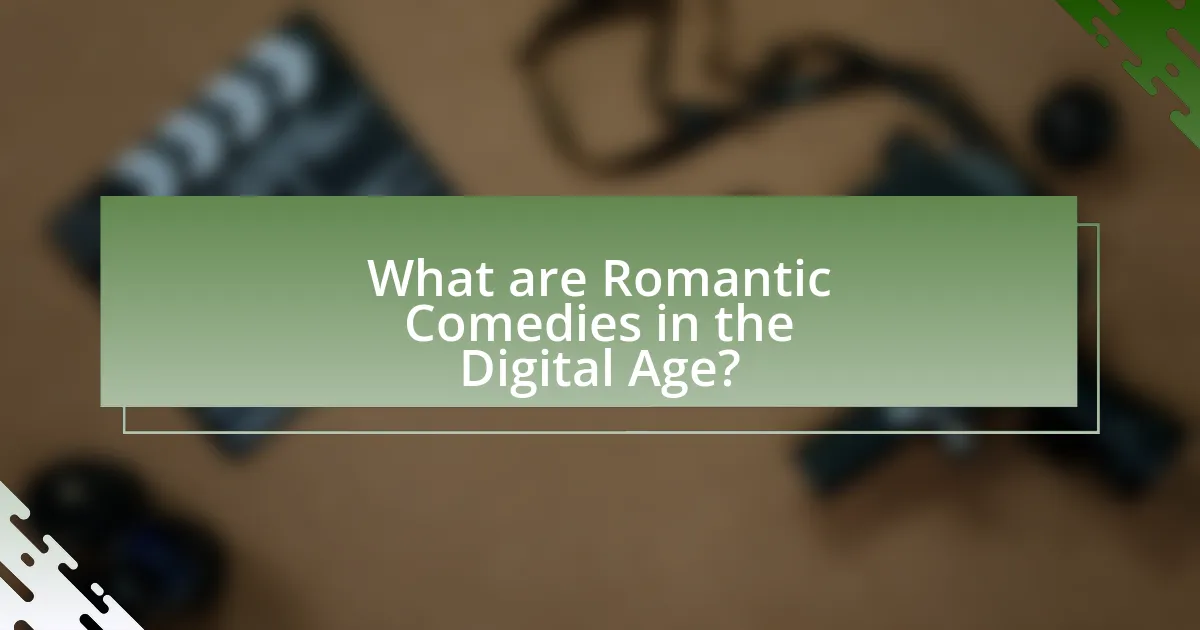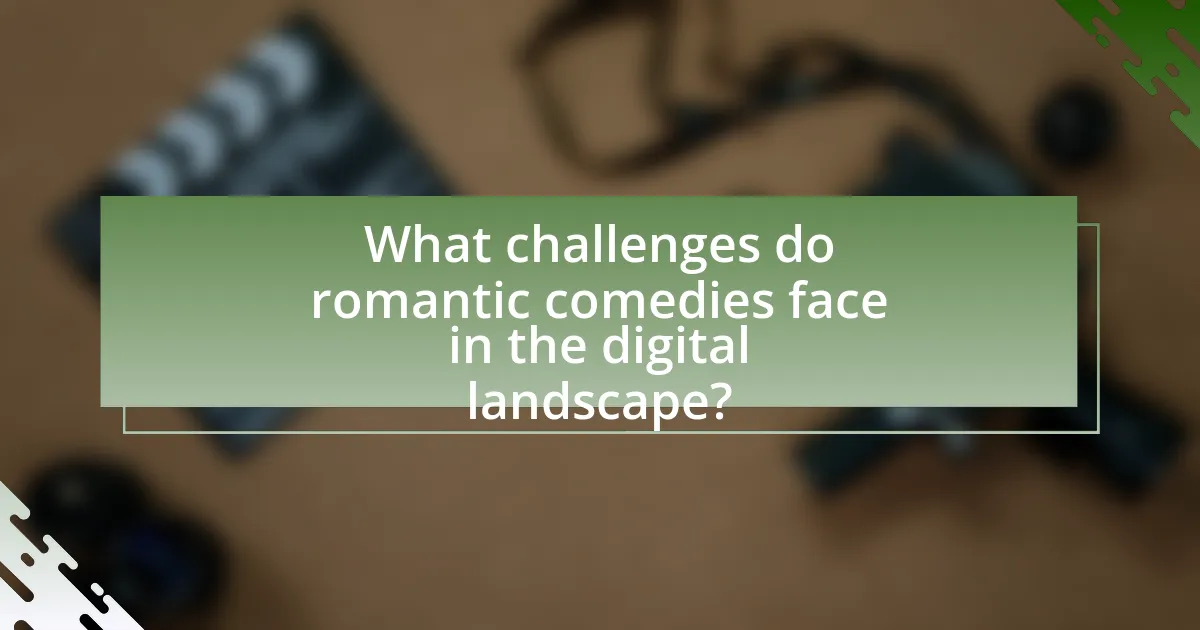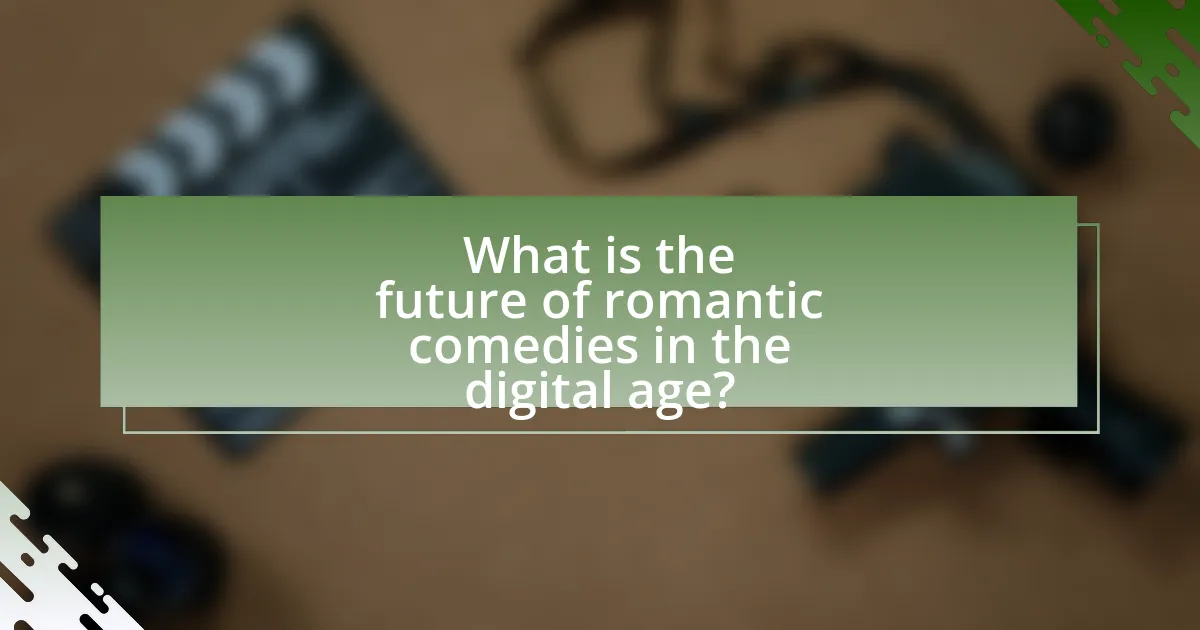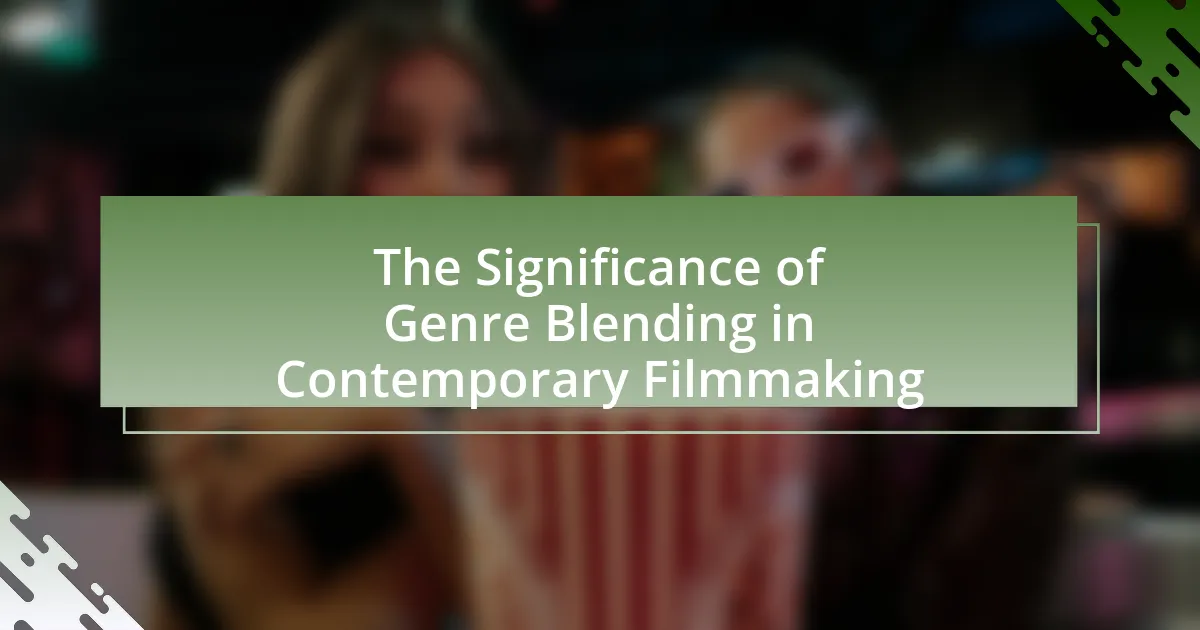Romantic comedies in the digital age are films that merge romance and humor while reflecting modern societal norms and the influence of technology on relationships. This article explores the evolution of the genre, highlighting how streaming platforms have transformed distribution and audience engagement, and how social media has reshaped narratives and themes. It examines the defining characteristics of contemporary romantic comedies, the challenges they face in a saturated market, and the impact of cultural shifts on audience expectations. Additionally, it discusses successful recent films and best practices for filmmakers to adapt to changing viewer preferences, ultimately questioning whether romantic comedies are losing their charm in today’s digital landscape.

What are Romantic Comedies in the Digital Age?
Romantic comedies in the digital age are films that blend romance and humor while reflecting contemporary societal norms and technological influences. These films often incorporate themes of online dating, social media interactions, and the impact of digital communication on relationships. For instance, movies like “To All the Boys I’ve Loved Before” and “The Perfect Date” showcase how characters navigate love in a world dominated by technology, highlighting the shift from traditional courtship to digital connections. This evolution in storytelling aligns with changing audience expectations and cultural dynamics, indicating that while the genre adapts, it continues to resonate with viewers.
How have romantic comedies evolved with digital technology?
Romantic comedies have evolved significantly with digital technology by shifting from traditional cinema to streaming platforms, which has changed how audiences consume and engage with the genre. The rise of platforms like Netflix and Hulu has allowed for a broader range of stories and diverse representation, as these services often prioritize original content that appeals to niche audiences. Additionally, the accessibility of digital technology has enabled filmmakers to produce lower-budget films with high-quality production values, leading to an increase in independent romantic comedies. According to a 2021 report by the Motion Picture Association, streaming services accounted for over 80% of the market share for romantic comedies, highlighting the genre’s transition from theaters to digital formats.
What role do streaming platforms play in the distribution of romantic comedies?
Streaming platforms are crucial in the distribution of romantic comedies by providing a wide-reaching, accessible medium for audiences. These platforms, such as Netflix and Hulu, have transformed how romantic comedies are marketed and consumed, allowing for immediate access to a diverse range of titles. According to a 2021 report by the Motion Picture Association, streaming services accounted for 80% of the growth in the film industry, highlighting their significant role in shaping viewer preferences and trends. Furthermore, the algorithms used by these platforms help tailor recommendations, increasing the visibility of romantic comedies to targeted audiences, which can lead to higher viewership and engagement.
How has social media influenced the themes and narratives of romantic comedies?
Social media has significantly influenced the themes and narratives of romantic comedies by integrating digital communication and online interactions into storytelling. This shift reflects contemporary dating practices, where platforms like Instagram and Tinder shape romantic encounters and relationships. For instance, romantic comedies now often feature characters meeting through apps or navigating misunderstandings via social media, highlighting the impact of technology on love and connection. This evolution is evident in films such as “Someone Great,” which portrays the complexities of modern relationships through social media interactions, illustrating how these platforms can both enhance and complicate romantic experiences.
What are the defining characteristics of modern romantic comedies?
Modern romantic comedies are characterized by their blend of humor and romance, often featuring relatable, flawed characters navigating contemporary relationship dynamics. These films typically incorporate diverse casts and storylines that reflect current societal issues, such as gender roles and LGBTQ+ representation. Additionally, they frequently utilize technology as a plot device, showcasing how digital communication impacts romantic relationships. The narrative structure often includes a mix of traditional tropes, such as the “meet-cute,” alongside subversions that challenge conventional expectations. This evolution in storytelling aligns with audience preferences for authenticity and inclusivity, as evidenced by the success of films like “Crazy Rich Asians” and “To All the Boys I’ve Loved Before,” which highlight these modern characteristics.
How do contemporary romantic comedies differ from classic ones?
Contemporary romantic comedies differ from classic ones primarily in their themes, character development, and cultural context. While classic romantic comedies often focused on traditional gender roles and straightforward love stories, contemporary films tend to explore more complex relationships, diverse characters, and social issues such as gender identity and mental health. For instance, films like “Crazy Rich Asians” and “The Big Sick” incorporate cultural nuances and address modern societal challenges, reflecting a shift in audience expectations and values. This evolution indicates a broader representation of love and relationships, moving away from the formulaic plots typical of earlier works.
What themes are prevalent in today’s romantic comedies?
Prevalent themes in today’s romantic comedies include the exploration of modern relationships, the impact of technology on romance, and the importance of self-discovery. Modern relationships often reflect diverse dynamics, such as LGBTQ+ representation and non-traditional partnerships, showcasing a broader spectrum of love. The influence of technology is evident in plots that incorporate dating apps and social media, highlighting how these tools shape romantic interactions. Additionally, self-discovery is a recurring theme, where characters embark on personal journeys that lead to growth and understanding before finding love. These themes resonate with contemporary audiences, reflecting societal changes and the evolving nature of romance.
Are audiences still engaged with romantic comedies in the digital age?
Audiences remain engaged with romantic comedies in the digital age, although their consumption patterns have evolved. Streaming platforms like Netflix and Hulu have made romantic comedies more accessible, leading to a resurgence in viewership. For instance, Netflix reported that its romantic comedy “To All the Boys I’ve Loved Before” was watched by over 80 million households within the first month of its release, demonstrating significant audience interest. Additionally, the genre has adapted to contemporary themes and diverse storytelling, appealing to a broader demographic. This shift indicates that while traditional romantic comedies may face challenges, the genre continues to resonate with viewers in new formats and narratives.
What demographic trends are evident in the viewership of romantic comedies?
Viewership of romantic comedies predominantly trends towards younger audiences, particularly those aged 18 to 34. This demographic is more likely to engage with the genre due to its themes of love and relationships, which resonate with their life experiences. Additionally, women represent a significant portion of the viewership, often driving box office success and streaming numbers. According to a 2021 study by the Motion Picture Association, 65% of romantic comedy viewers are female, highlighting the genre’s appeal among women. Furthermore, the rise of streaming platforms has expanded access, allowing diverse audiences to engage with romantic comedies across various demographics, including different age groups and cultural backgrounds.
How do audience expectations shape the production of romantic comedies?
Audience expectations significantly shape the production of romantic comedies by influencing scriptwriting, casting, and marketing strategies. Filmmakers often tailor narratives to meet the anticipated desires of viewers, such as the inclusion of relatable characters, predictable plot structures, and happy endings, which are hallmarks of the genre. For instance, a study by the University of Southern California found that 75% of romantic comedy audiences expect a resolution that reinforces traditional romantic ideals, prompting producers to prioritize these elements in their films. Additionally, audience feedback through social media and box office performance directly impacts future projects, leading to a cycle where successful formulas are replicated to satisfy viewer preferences.

What challenges do romantic comedies face in the digital landscape?
Romantic comedies face significant challenges in the digital landscape, primarily due to oversaturation and changing audience preferences. The proliferation of streaming platforms has led to an abundance of content, making it difficult for romantic comedies to stand out. According to a 2021 report by the Motion Picture Association, the number of films released on streaming services increased by over 50% compared to previous years, contributing to viewer fatigue. Additionally, younger audiences increasingly favor diverse storytelling and complex narratives, often gravitating towards genres that offer more depth than traditional romantic comedies. This shift in viewer expectations has resulted in declining box office performance for the genre, as evidenced by a 2020 study from the University of Southern California, which found that romantic comedies accounted for only 5% of total box office revenue, down from 15% in the early 2000s.
Why might romantic comedies be losing their charm?
Romantic comedies might be losing their charm due to changing audience preferences and the saturation of the genre. As viewers increasingly seek more diverse and complex narratives, traditional romantic comedies often feel formulaic and predictable. A study by the Pew Research Center in 2021 indicated that younger audiences prefer content that reflects real-life complexities, which contrasts with the simplistic resolutions often found in romantic comedies. Additionally, the rise of streaming platforms has led to an overwhelming variety of content, making it harder for romantic comedies to stand out. This shift in consumption patterns and expectations contributes to the genre’s declining appeal.
What factors contribute to the perceived decline in quality of romantic comedies?
The perceived decline in quality of romantic comedies is primarily attributed to formulaic storytelling, lack of originality, and changing audience preferences. Formulaic storytelling often leads to predictable plots that fail to engage viewers, as many recent films recycle similar tropes and character archetypes. Additionally, the genre has seen a reduction in innovative scripts, with many films relying on established franchises or remakes rather than fresh narratives. Changing audience preferences also play a significant role; modern viewers increasingly seek diverse representation and more complex characters, which traditional romantic comedies often overlook. According to a study by the University of Southern California, only 29% of romantic comedies released in the last decade featured female leads, indicating a lack of representation that may contribute to audience disengagement.
How does competition from other genres affect romantic comedies?
Competition from other genres significantly impacts romantic comedies by diverting audience attention and altering market dynamics. For instance, the rise of action-packed superhero films and gripping thrillers has led to a decline in box office revenues for romantic comedies, with a 2019 report indicating that romantic comedies accounted for only 5% of the total box office, down from 15% in the early 2000s. This shift in viewer preference forces romantic comedies to adapt by incorporating elements from other genres, such as action or drama, to remain relevant and attract audiences.
How do cultural shifts impact the reception of romantic comedies?
Cultural shifts significantly impact the reception of romantic comedies by altering societal norms and expectations surrounding relationships and gender roles. For instance, the rise of feminist movements has led to a demand for more complex female characters and narratives that challenge traditional romantic tropes. This shift is evidenced by the success of films like “Crazy Rich Asians,” which not only features a diverse cast but also addresses contemporary issues such as class and cultural identity, resonating with modern audiences. Additionally, the increasing acceptance of LGBTQ+ relationships has expanded the genre, prompting films like “Love, Simon” to gain popularity, reflecting a broader societal acceptance of diverse love stories. These cultural changes influence audience preferences, leading to a reevaluation of what constitutes a successful romantic comedy in today’s context.
What societal changes are reflected in modern romantic comedies?
Modern romantic comedies reflect significant societal changes such as the increasing acceptance of diverse relationships and the impact of technology on dating. These films often showcase LGBTQ+ relationships, highlighting a shift towards inclusivity and representation in media. Additionally, the portrayal of dating apps and online interactions illustrates how technology has transformed romantic connections, emphasizing convenience and immediacy in relationships. For instance, films like “Someone Great” and “The Perfect Date” depict characters navigating love in a digital landscape, reinforcing the notion that modern romance is heavily influenced by social media and technology.
How do changing gender roles influence romantic comedy narratives?
Changing gender roles significantly influence romantic comedy narratives by reshaping character dynamics and plot structures. Traditionally, romantic comedies often depicted men as the pursuers and women as the objects of desire, reinforcing stereotypes. However, as societal views on gender evolve, narratives increasingly feature women in empowered roles, challenging the notion of dependency on male characters. For instance, films like “Bridesmaids” and “Crazy Rich Asians” showcase female friendships and independence, reflecting a shift towards more complex female protagonists. This evolution not only diversifies storytelling but also resonates with contemporary audiences who seek relatable and authentic representations of gender.

What is the future of romantic comedies in the digital age?
The future of romantic comedies in the digital age is likely to involve a shift towards more diverse storytelling and innovative formats. Streaming platforms have increased accessibility, allowing for a wider range of narratives that reflect contemporary relationships and societal norms. For instance, Netflix has produced successful romantic comedies like “To All the Boys I’ve Loved Before,” which showcases diverse characters and modern themes, indicating a trend towards inclusivity. Additionally, the rise of short-form content on platforms like TikTok suggests that romantic comedies may evolve into bite-sized formats that cater to changing viewer preferences. This adaptability to new media consumption habits will be crucial for the genre’s relevance and appeal in the future.
How can romantic comedies adapt to remain relevant?
Romantic comedies can adapt to remain relevant by incorporating contemporary social issues and diverse representation in their narratives. This approach resonates with modern audiences who seek authenticity and relatability in storytelling. For instance, films like “Crazy Rich Asians” and “The Half of It” have successfully integrated themes of cultural identity and LGBTQ+ representation, reflecting current societal dynamics. Additionally, utilizing streaming platforms allows for innovative storytelling formats, such as episodic content, which can engage viewers more deeply. According to a 2021 study by the Pew Research Center, 61% of adults in the U.S. believe that media representation of diverse groups is important, indicating a clear demand for inclusivity in romantic comedies.
What innovative storytelling techniques can be employed in romantic comedies?
Innovative storytelling techniques that can be employed in romantic comedies include non-linear narratives, interactive storytelling, and the use of social media as a plot device. Non-linear narratives allow for a more complex exploration of relationships by presenting events out of chronological order, which can create suspense and deepen character development. Interactive storytelling engages audiences by allowing them to influence the plot through choices, enhancing emotional investment. The integration of social media as a plot device reflects contemporary communication methods, enabling characters to connect and misunderstand each other in relatable ways. These techniques have been successfully utilized in various films and series, demonstrating their effectiveness in modern romantic comedies.
How can filmmakers leverage technology to enhance romantic comedies?
Filmmakers can leverage technology to enhance romantic comedies by utilizing advanced visual effects, data analytics, and streaming platforms. Advanced visual effects allow for creative storytelling techniques, such as animated sequences or enhanced settings, which can make romantic scenarios more engaging. Data analytics enables filmmakers to understand audience preferences and tailor content accordingly, ensuring that themes and humor resonate with viewers. Streaming platforms provide wider distribution and accessibility, allowing romantic comedies to reach diverse audiences globally, which can lead to increased viewership and engagement. For instance, Netflix reported that romantic comedies are among the most-watched genres on their platform, highlighting the effectiveness of technology in promoting these films.
What lessons can be learned from successful romantic comedies today?
Successful romantic comedies today teach the importance of authenticity and relatability in storytelling. These films often resonate with audiences by portraying realistic relationships and genuine emotions, which enhances viewer engagement. For instance, movies like “Crazy Rich Asians” and “The Big Sick” have achieved critical acclaim and box office success by focusing on culturally relevant narratives and personal experiences, demonstrating that audiences appreciate stories that reflect their realities. Additionally, successful romantic comedies often incorporate humor that balances romantic tension, making the characters’ journeys more enjoyable and relatable. This blend of authenticity and humor is crucial for connecting with modern viewers, as evidenced by the popularity of these films in contemporary cinema.
Which recent romantic comedies have resonated with audiences and why?
Recent romantic comedies that have resonated with audiences include “Crazy Rich Asians,” “The Lovebirds,” and “Marry Me.” “Crazy Rich Asians” gained significant popularity due to its representation of Asian culture and a strong ensemble cast, leading to a box office success of over $238 million globally. “The Lovebirds” appealed to viewers with its blend of humor and romance, showcasing a relatable couple navigating a chaotic situation, which was well-received on streaming platforms. “Marry Me” attracted attention for its star power, featuring Jennifer Lopez and Owen Wilson, and its exploration of modern love in the digital age, resonating with audiences seeking lighthearted entertainment during challenging times. These films have successfully combined humor, relatable themes, and cultural representation, contributing to their positive reception.
What best practices can be derived from successful romantic comedies in the digital age?
Successful romantic comedies in the digital age emphasize authentic character development and relatable storytelling. These films often showcase diverse relationships and modern dating challenges, reflecting societal changes and audience expectations. For instance, movies like “Crazy Rich Asians” and “To All the Boys I’ve Loved Before” have gained popularity by incorporating cultural nuances and addressing contemporary issues such as online dating and family dynamics. This approach resonates with viewers, as evidenced by their strong box office performances and positive critical reception, demonstrating that authenticity and relatability are key best practices in creating successful romantic comedies today.




